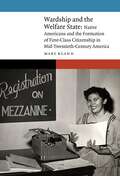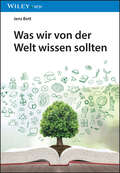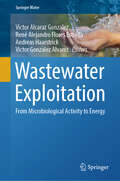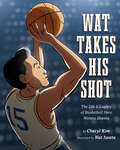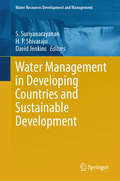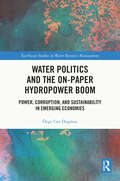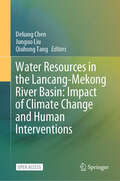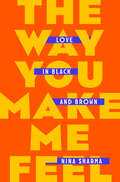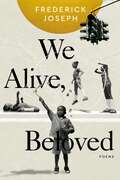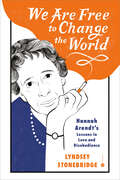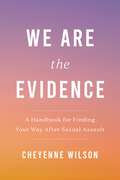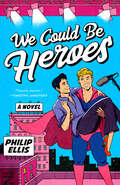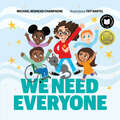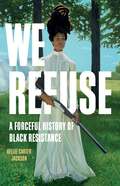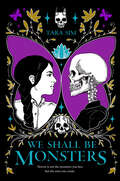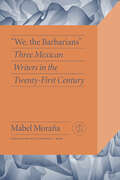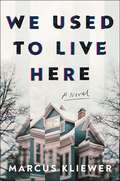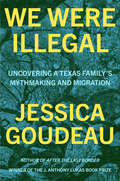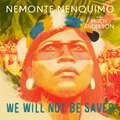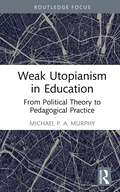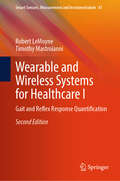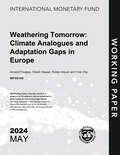- Table View
- List View
Wardship and the Welfare State: Native Americans and the Formation of First-Class Citizenship in Mid-Twentieth-Century America (New Visions in Native American and Indigenous Studies)
by Mary KlannWardship and the Welfare State examines the ideological dimensions and practical intersections of public policy and Native American citizenship, Indian wardship, and social welfare rights after World War II. By examining Native wardship&’s intersections with three pieces of mid-twentieth-century welfare legislation—the 1935 Social Security Act, the 1942 Servicemen&’s Dependents Allowance Act, and the 1944 GI Bill—Mary Klann traces the development of a new conception of first-class citizenship.Wardship and the Welfare State explores how policymakers and legislators have defined first-class citizenship against its apparent opposite, the much older and fraught idea of Indian wardship. Wards were considered dependent, while first-class citizens were considered independent. Wards were thought to receive gratuitous aid from the government, while first-class citizens were considered responsible. Critics of the federal welfare state&’s expansion in the 1930s through 1960s feared that as more Americans received government aid, they too could become dependent wards, victims of the poverty they saw on reservations. Because critics believed wardship prevented Native men and women from fulfilling expectations of work, family, and political membership, they advocated terminating Natives&’ trust relationships with the federal government. As these critics mistakenly equated wardship with welfare, state officials also prevented Native people from accessing needed welfare benefits. But to Native peoples wardship was not welfare and welfare was not wardship. Native nations and pan-Native organizations insisted on Natives&’ government-to-government relationships with the United States and maintained their rights to welfare benefits. In so doing, they rejected stereotyped portrayals of Natives&’ perpetual poverty and dependency and asserted and defined tribal sovereignty. By illuminating how assumptions about &“gratuitous&” government benefits limit citizenship, Wardship and the Welfare State connects Native people to larger histories of race, inequality, gender, and welfare in the twentieth-century United States.
Was wir von der Welt wissen sollten
by Jens BottDas Buch zum Mitreden in aktuellen Debatten in Wissenschaft und Gesellschaft Der Wunsch, die Welt verstehen zu wollen, ist so alt wie die Menschheit; wir suchen nach Erklärungen, benötigen Halt und Orientierung. Aus Annahmen und Überzeugungen, die uns plausibel erscheinen, formen wir unsere Weltbilder, Vorstellungen über die Beschaffenheit des Universums. Die jeweils herrschenden Vorstellungen haben sich mit der Zeit allerdings verändert. Bis zum Ende des Mittelalters lagen die Dinge noch einfach: Für die Menschen in Europa etwa war die Bibel die Quelle aller Wahrheit, ein universelles Sachbuch, das die Entstehung des Universums, die Artenvielfalt und den Ursprung des Sprachengewirrs erklärte, aber auch moralische Richtlinien vorgab. Mit der Zeit hat sich eine Reihe zentraler Theorien und Ideen herausgeschält, die den heutigen Wissenschafts-und Politikbetrieb prägen. Gleich, ob wir sie nun persönlich für richtig halten oder nicht, haben diese herrschenden Meinungen Einfluss auf unser tägliches Leben – und das mehr, als uns oftmals bewusst ist. Im ersten Teil des Buches (Die Natur) werden nach Darstellung der Grundlagendisziplin Mathematik zunächst die physikalischen Naturgesetze dargelegt, um dann zu zeigen, wie sich aus ihnen die Chemie und aus der Chemie die Biologie ergibt. Im Mittelpunkt stehen Newtons Mechanik, die Relativitätstheorie, die Quantenphysik und Darwins Evolutionstheorie. Das abschließende Kapitel erzählt die Naturgeschichte vom Urknall bis zum Erscheinen des Homo sapiens und fasst dabei die wesentlichen Aussagen noch einmal zusammen. Das erste Kapitel des zweiten Teils (Der Mensch) beschäftigt sich mit dem menschlichen Bewusstsein und leitet aus einer naturwissenschaftlichen Perspektive zu den geisteswissenschaftlichen Kapiteln Sprache (Ausdrucksform des Bewusstseins), Philosophie (Geschichte des Denkens), Gesellschaft (Theorie des Zusammenlebens) und Ökonomie (Umgang mit knappen Ressourcen) über. Das abschließende Kapitel erzählt die Menschheitsgeschichte bis heute, wobei wiederum die zentralen Aussagen noch einmal zusammengefasst werden.
Wastewater Exploitation: From Microbiological Activity to Energy (Springer Water)
by Andreas Haarstrick Victor Alcaraz Gonzalez René Alejandro Flores Estrella Victor Gonzalez AlvarezWith all the current efforts to use non-fossil sources as a starting point for future energy solutions, consideration is also being given to using microbial activities as a direct or indirect source of energy production. This ranges from the use of algae as biomass or as H2 producers, anaerobic microorganisms to produce methane, hydrogen, and even electricity directly. This book deals with both theoretical and technical possibilities of using anaerobic microorganisms in combination with wastewater as a substrate source to produce biofuels and bioenergy in the form of biomass, CH4 and H2 as well as the corresponding power densities and electricity quantities in economically justifiable processes. Unique process facilities are widely addressed; however, special interest is also placed in biorefinery and circular economy related concepts. The theoretical background as well as application examples are presented.
Wat Takes His Shot: The Life & Legacy of Basketball Hero Wataru Misaka
by Cheryl KimThe stirring biography of Japanese American basketball star Wataru Misaka--the first person of color to play in the NBA!As a kid, Wataru Misaka channeled his endless energy into playing sports. Every Sunday, he raced to the park where his Japanese American community came together to play basketball. Wat wasn't the tallest on the team, but he was fast and loved the game! Encouraged by his father to always do his best, Wat applied this mentality to every aspect and challenge in his life. Wat was a college student when the US government forced more than 122,000 Japanese Americans living on the West Coast into incarceration camps during WWII. He overcame racism and segregation to join his college's basketball team but despite Wat's impressive skills, he was treated as an outsider because he was Japanese American. Wat kept his eye on the ball, and his team-player mentality made him shine on and off the court. He became an inspiration to his Japanese American community. After helping Utah University's basketball team win the national championship in 1947, Wat was drafted by the New York Knicks, making him the first person of color to play in the NBA. Wat's motivational story of rising to any challenge and bringing your best to everything you do is a reminder of the power we each have to inspire others--if we just take our shot!
Water Management in Developing Countries and Sustainable Development (Water Resources Development and Management)
by David Jenkins S. Suriyanarayanan H. P. ShivarajuThis book provides information on sustainable water resource management strategies that present innovative ways to conserve both quality and quantity of water in developing countries. The book comprises of 24 chapters contributed by authors from 14 countries, namely, Cameroon, China, Cyprus, India, Indonesia, Italy, Namibia, the Netherlands, Norway, Portugal, South Africa, the United Kingdom, the United States of America and Zimbabwe. This book will be of great interest to researchers, practitioners, water resource managers, policy and decision makers, international institutions, governmental and non-governmental organizations, educators, as well as students.
Water Politics and the On-Paper Hydropower Boom: Power, Corruption, and Sustainability in Emerging Economies (Earthscan Studies in Water Resource Management)
by Özge Can DogmusThis book examines how the on-paper hydropower boom impacts the safe and fair access to water and energy in emerging economies.The global hydropower boom is largely made up of small hydropower plants located in emerging economies, but a lack of funding, over-ambitious planning, and corruption have halted the production of these projects. Describing this state as the ‘on-paper’ hydropower boom, this book shifts attention to the hydrosocial problems arising from hydropower projects that remain on paper. It examines how these proposed but unbuilt projects can lead to disruptions in the control and governance of water resources and increase the international dependence of emerging countries due to deep problems in their sustainable development planning and how all this can affect both ecosystems and the communities that depend on them. In doing so, it critically examines the dominant discourses on energy security and sustainable development, emphasises the extent to which the effects of global imperialism are at play, and examines the effects of international power relations in the hydrosocial context and their implications for perpetuating international relations of dependency. Further, this book provides a unique perspective on the global hydropower boom by highlighting that although the global hydropower boom largely remains on paper, it can still have a significant impact on human–water systems. Contributing to the debate on hydrosocial relationships, each chapter offers an insightful examination of the social, cultural, and political interactions that humans have with water and uses these insights to provide a nuanced understanding of the challenges and issues associated with on-paper plans.This book will be of great interest to students and scholars of water politics, water governance, political ecology, corruption and environmental economics, as well as sustainable development policymakers.
Water Resources in the Lancang-Mekong River Basin: Impact of Climate Change and Human Interventions
by Qiuhong Tang Deliang Chen Junguo LiuThis open access book provides a comprehensive, up-to-date picture of the current state of knowledge covering climate change, surface water change, arsenic pollution, water utilization, water-food-energy nexus, water related hazards, water management, and water governance in the Lancang-Mekong River Basin. Considering the widely concerned fact that the climate change and human intervention induced impacts on water will bring unprecedented threats to human societies and ecosystems, the book intends to support UN’s sustainable development goals through sustainable use of water by providing the most accurate and updated information on climate and water changes in a consistent way. Underlying all aspects of the book is a strong commitment to assessing the science comprehensively, without bias and in a way that is relevant to policy but not policy prescriptive. It can provide implications to support decision-makers and stakeholders for integrated water resources management and sustainable development at all levels.
Watery Planet: How a water crisis is impacting our world
by Anna ClaybourneWatery Planet offers young readers a clear, insightful look at Earth's ongoing water challenges.Water makes our life on Earth possible. We need water not just to drink and keep clean, but also for agriculture, industry, transport and much, much more. But despite having an enormous amount of water on Earth, only 1 per cent of it is available for us to use and it's at increasing risk.Watery Planet looks at the reasons behind our looming water crisis - from uneven distribution to water wastage, pollution and climate change. It explores how floods, droughts and rising sea levels are becoming a stark reality as the world warms and describes how we are adapting to these challenges. It also looks at some positive, practical solutions to our water problems and explains how we can all do our part to help save Earth's most precious resource.Contents:A WHOLE WORLD OF WATER WE ALL NEED WATER! HOW WE GET WATER IS THERE ENOUGH WATER? WATER AND HEALTH CASE STUDY: COLLECTING WATER IN ETHIOPIA WATER POLLUTION WATER AND GLOBAL WARMING FLOODS AND DROUGHTS CASE STUDY: PAKISTAN FLOODS RISING SEA LEVELS WATER AND NATURE WATER AND WILDLIFE CASE STUDY: THIRSTY AVOCADOS DOING THINGS DIFFERENTLY WATER FOR THE WORLD CASE STUDY: THE ARAL SEA WATERY HOMES WHAT CAN YOU DO? THE FUTURE OF WATER GLOSSARY FURTHER READING INDEX Titles in this series:Plastic PlanetHot PlanetRecycled PlanetSustainable PlanetExtinction PlanetPeaceful Planet?Unequal Planet
The Way Forward (Mockingbird Bridge #1)
by Eliana WestThe small town he couldn&’t wait to leave is calling him home… Dax Ellis returns to Colton, Mississippi, a changed man. He traveled the world, earned a fortune, and made a lifetime of memories, but now he longs to put down roots. Time hasn&’t been kind to his hometown, and Dax wants to help—if only he can convince everyone he&’s not the same petulant boy he used to be. Especially the one woman who has every reason not to trust him. Librarian Callie Colton cherished summers with her grandparents, in the town her ancestors helped build, in spite of the boy who called her names. Now that Colton is her home, life is quiet until Dax returns…and, along with him, threatening letters on her doorstep. He may still have the power to hurt her, but she&’s not the same scared little girl she used to be. But as the danger escalates, Dax will have to face his past to find a way forward for the relationship they were cheated of once before.
The Way You Make Me Feel: Love in Black and Brown
by Nina Sharma&“Remarkable . . . The Way You Make Me Feel affirms that Black and Brown existence in America comes with no guarantee of collective solidarity, no innate promise of racial equality. The path to justice is uncertain, Sharma reminds us, and we must each work hard—and be bold enough to sacrifice our own comfort—to actualize it.&” —Washington PostA hilarious and moving memoir in essays about love and allyship, told through one Asian and Black interracial relationshipWhen Nina Sharma meets Quincy while hitching a ride to a friend&’s Fourth of July barbecue, she spots a favorite book, Maxine Hong Kingston&’s The Woman Warrior, in the back seat of his cramped car, and senses a sadness from him that&’s all too familiar to her. She is immediately intrigued—who is this man? In The Way You Make Me Feel, Sharma chronicles her and Quincy&’s love story, and in doing so, examines how their Black and Asian relationship becomes the lens through which she moves through and understands the world.In a series of sensual and sparkling essays, Sharma reckons with caste, race, colorism, and mental health, moving from her seemingly idyllic suburban childhood through her and Quincy&’s early sweeping romance in the so-called postracial Obama years and onward to their marriage. Growing up, she hears her parents talk about the racism they experienced at the hands of white America—and as an adult, she confronts the complexities of American racism and the paradox of her family&’s disappointment when she starts dating a Black man. While watching The Walking Dead, Sharma dives into the eerie parallels between the brutal death of Steven Yeun&’s character and the murder of Vincent Chin. She examines the trailblazing Mira Nair film Mississippi Masala, revolutionary in its time for depicting a love story between an Indian woman and a Black man on screen, and considers why interracial relationships are so often assumed to include white people. And as she and Quincy decide whether to start a family, they imagine a universe in which Vice President Kamala Harris could possibly be their time-traveling daughter.Written with a keen critical eye and seamlessly weaving in history, pop culture, and politics, The Way You Make Me Feel reaffirms the idea that allyship is an act of true love.
We Alive, Beloved
by Frederick JosephNYT Bestselling Author, Frederick Joseph, explores a new genre in this captivating poetry collection that seeks to find joy in moments of difficulty whether through illuminating the beauty of being Black, highlighting the hope that can be found in childhood, or by sharing intimate truths revealed on a mental health journey. This book will appeal to both new and established readers of poetry.Step into the world of We Alive, Beloved, where its words will resonate within the deepest corners of your soul, leaving a mark on your heart and a renewed appreciation for the beauty of being alive. We Alive, Beloved moves beyond being a poetry collection; it's a celebration of the profound aspects of our existence. Each poem seeks to immortalize the fleeting moments of joy, love, resilience, and inspiration that often slip through the grasp of our fast-paced lives. In this poetic testament, we defy the ephemeral nature of beauty and goodness, daring to clutch onto these facets of life for just a little longer. With words that stand as guardians against the relentless march of time and the ceaseless tides of change, trauma, and grief, this collection becomes a sanctuary of light in a world that sometimes seems dim. We Alive, Beloved explores a rich tapestry of themes, from the intricacies of relationships and the heartache of loss, to the wide-eyed wonder of existence and the challenges of exploring the possibility of parenthood in our modern age. Each poem reaches out to readers, offering a mirror to their own journeys and emotions, inviting them to be seen and acknowledged in its lyrical embrace.
We Are Free to Change the World: Hannah Arendt's Lessons in Love and Disobedience
by Lyndsey StonebridgeA timely guide on how to live—and think—through the challenges of our century drawn from the life and thought of political theorist Hannah Arendt, one of the twentieth century&’s foremost opponents of totalitarianism&“We are free to change the world and to start something new in it.&”—Hannah ArendtThe violent unease of today&’s world would have been familiar to Hannah Arendt. Tyranny, occupation, disenchantment, post-truth politics, conspiracy theories, racism, mass migration: She lived through them all.Born in the first decade of the last century, she escaped fascist Europe to make a new life for herself in America, where she became one of its most influential—and controversial—public intellectuals. She wrote about power and terror, exile and love, and above all, about freedom. Questioning—thinking—was her first defense against tyranny. She advocated a politics of action and plurality, courage and, when necessary, disobedience.We Are Free to Change the World is a book about the Arendt we need for the twenty-first century. It tells us how and why Arendt came to think the way she did, and how to think when our own politics goes off the rails. Both a guide to Arendt&’s life and work, and its dialogue with our troubled present, We Are Free to Change the World is an urgent call for us to think, as Hannah Arendt did—unflinchingly, lovingly, and defiantly—through our own unpredictable times.
We Are the Evidence: A Handbook for Finding Your Way After Sexual Assault
by Cheyenne WilsonA necessary, reassuring guide for all sexual assault survivors in need of immediate emotional and legal support post assault, and in the months and years after.We Are the Evidence is the first comprehensive resource for survivors of sexual assault. Written with conviction and compassion by Cheyenne Wilson, a registered nurse and survivor of sexual assault, this handbook contains everything victims and advocates need to know to navigate the tumultuous times that follow an assault. Within, there's advice for: The appropriate steps to take immediately after an assault Disclosing your assault how and when you choose How to pursue justice and navigate the legal system Beginning the healing process and reclaiming your power Throughout, you'll find exercises, opportunities to rest, and invaluable guidance from experts like attorneys, detectives and therapists. Voices from other sexual assault survivors also lend their support. Meant to be easily accessible, everything is organized for you to go right to the topic you most need guidance for, no matter where you are on your healing journey. You deserve to be heard, believed, and supported.
We Could Be Heroes
by Philip EllisNot all heroes wear capes. Some wear high heels and a wig.Patrick's acting career is on the rise, and the superhero movie he's filming might put him on the map . . . if the endless reshoots ever stop. Meanwhile, Will, a secondhand bookseller and part-time drag queen, is just trying to live his best life. After a chance encounter on a particularly chaotic night, a curious friendship sparks between the two men.At least, that&’s what they tell each other. Sure, Patrick finds Will captivatingly hilarious, and Will can&’t help but keep thinking about who is really behind the perfect mask Patrick shows the rest of the world, but nothing could ever really happen, right? Superheroes don&’t date drag queens, after all.When reality crashes into the fantasy world they&’ve built together, Will has to make a choice between the man of his dreams and being true to himself. Can Patrick be the hero Will&’s been waiting for, or will Will be the one to save Patrick after all? Uproarious and touching, We Could Be Heroes is an ode to queer joy and a romance that just might save the world.
We Need Everyone
by Michael Redhead ChampagneEveryone has a gift. Every gift is different, and every gift is special. Our world needs you to share your gift.What is your gift? How can you use your gift to help others?We Need Everyone empowers children to identify their gifts and use them to overcome challenges, achieve goals, and strengthen communities. Inspiring and uplifting, this interactive picture book celebrates diverse cultures, perspectives, and abilities through playful illustrations. Perfect for reading aloud.
We Refuse: A Forceful History of Black Resistance
by Kellie Carter JacksonAn &“unsparing, erudite, and incisive&” (Jelani Cobb) reframing of the past and present of Black resistance—both nonviolent and violent—to white supremacy Black resistance to white supremacy is often reduced to a simple binary, between Dr. Martin Luther King Jr.&’s nonviolence and Malcolm X&’s &“by any means necessary.&” In We Refuse, historian Kellie Carter Jackson urges us to move past this false choice, offering an unflinching examination of the breadth of Black responses to white oppression, particularly those pioneered by Black women. The dismissal of &“Black violence&” as an illegitimate form of resistance is itself a manifestation of white supremacy, a distraction from the insidious, unrelenting violence of structural racism. Force—from work stoppages and property destruction to armed revolt—has played a pivotal part in securing freedom and justice for Black people since the days of the American and Haitian Revolutions. But violence is only one tool among many. Carter Jackson examines other, no less vital tactics that have shaped the Black struggle, from the restorative power of finding joy in the face of suffering to the quiet strength of simply walking away. Clear-eyed, impassioned, and ultimately hopeful, We Refuse offers a fundamental corrective to the historical record, a love letter to Black resilience, and a path toward liberation.
We Shall Be Monsters
by Tara SimFrankenstein meets Indian mythology in this twisty, darkly atmospheric fantasy where the real horrors are not the monsters you face, but the ones you create.&“One of the most unique and intelligent books I&’ve read. . . Alluring, completely enthralling, and masterfully rendered.&” —Axie Oh, New York Times bestselling author of The Girl Who Fell Beneath the SeaKajal knows she is not a good person. If she were, she wouldn&’t selfishly be risking her sister&’s soul in a dangerous bid to bring her back to life. She would let Lasya rest in peace—but Kajal cannot stand the horror of living without her.As Kajal prepares for the resurrection, the worst happens: Her sister&’s soul warps into a bhuta—a murderous, wraith-like spirit—and Kajal gets sentenced to death for her sister&’s rampage. There seems little hope of escape until two strangers offer to free her. The catch: She must resurrect the kingdom&’s fallen crown prince to aid a growing rebellion against a tyrannical usurper. Desperate, Kajal rushes to complete her end of the deal . . . only to discover that the boy she&’s resurrected, Tav, is not the crown prince.Now Kajal—prickly, proud, admirer of the scientific method—must team up with Tav—stubborn, reticent, and fonder of swords than of books—to find the real crown prince. With only a scalpel and her undead dog, Kutaa, at her side, Kajal must work fast before her mistake is exposed or Lasya&’s bhuta turns its murderous fury on the person truly responsible for her death: Kajal herself.
"We, the Barbarians": Three Mexican Writers in the Twenty-First Century (Critical Mexican Studies)
by Mabel Moraña&“We, the Barbarians&” embarks on a careful and exhaustive reading of three of the most prominent authors in the latest wave of Mexican fiction: Yuri Herrera, Fernanda Melchor, and Valeria Luiselli. Originally published in Mexico in 2021, this work is divided into three parts, one for each author&’s narrative production. The book analyzes all of the literary works published by Herrera, Melchor, and Luiselli from the beginning of their writing careers until 2021, allowing for a diachronic interpretation of their respective narrative projects as well as for comparative approaches to their aesthetic and ideological contours. Characterized by the fragmentation of civil society and the decomposition of the myths that accompanied the consolidation of the modern nation, Mexican visual and literary arts have explored a myriad of representational avenues to approach the phenomena of violence, institutional decay, and political instability. The critical and theoretical approaches in &“We, the Barbarians&” explore a variety of alternative symbolic representations of topics such as nationalism, community, and affect in times impacted by systemic violence, precariousness, and radical inequality. Moraña perceives the negotiations between regional/local imaginaries and global scenarios characterized by the devaluation and resignification of life, both at individual and collective levels. Though it uses three authors as its focus, this book seeks to more broadly theorize the question of the relationship between literature and the social in the twenty-first century.
We Used to Live Here: A Novel
by Marcus KliewerGet Out meets Parasite in this eerily haunting debut and Reddit hit—soon to be a Netflix original movie starring Blake Lively—about two homeowners whose lives are turned upside down when the house&’s previous residents unexpectedly visit.As a young, queer couple who flip houses, Charlie and Eve can&’t believe the killer deal they&’ve just gotten on an old house in a picturesque neighborhood. As they&’re working in the house one day, there&’s a knock on the door. A man stands there with his family, claiming to have lived there years before and asking if it would be alright if he showed his kids around. People pleaser to a fault, Eve lets them in. As soon as the strangers enter their home, uncanny and inexplicable things start happening, including the family&’s youngest child going missing and a ghostly presence materializing in the basement. Even more weird, the family can&’t seem to take the hint that their visit should be over. And when Charlie suddenly vanishes, Eve slowly loses her grip on reality. Something is terribly wrong with the house and with the visiting family—or is Eve just imagining things?
We Were Illegal: Uncovering a Texas Family's Mythmaking and Migration
by Jessica GoudeauAn award-winning author's deep exploration of pivotal moments in Texas history through multiple generations of her own family, and a ruthless reexamination of our national and personal mythsSeven generations of Jessica Goudeau&’s family have lived in Texas, and her family&’s legacy—a word she heard often growing up—was rooted in faith, right-living, and the hard work that built their great state. It wasn&’t until her aunt mentioned a stowaway ancestor and she began to dig more deeply into the story of the land she lives on today in suburban Austin, that Goudeau discovered her family&’s far more complicated role in Texas history: from a swindling land grant agent in the earliest days of Anglo settlement that brought slavery to Mexican land, up through her Texas Ranger great-uncle, who helped a sociopathic sheriff cover up mass murder. Tracking her ancestors&’ involvement in pivotal moments from before the Texas Revolution through today, We Were Illegal is at once an intimate and character-driven narrative and an insider&’s look at a state that prides itself on its history. It is an act of reckoning and recovery on a personal scale, as well as a reflection of the work we all must do to dismantle the whitewashed narratives that are passed down through families, communities, and textbooks. And it is a story filled with hope—by facing these hypocrisies and long-buried histories, Goudeau explores with us how to move past this fractured time, take accountability for our legacy, and learn to be better, more honest ancestors.
We Will Not Be Saved: A memoir of hope and resistance in the Amazon rainforest
by Nemonte Nenquimo'Nemonte's writing is as provocative as it is inspiring' EMMA THOMPSON'One of the most effective leaders for indigenous rights and environmental justice' LAURENE POWELL JOBS'I'm here to tell you my story, which is also the story of my people and the story of this forest.'Born into the Waorani tribe of Ecuador's Amazon rainforest, Nemonte Nenquimo was taught about plant medicines, foraging, oral storytelling, and shamanism by her elders. Age 14, she left the forest for the first time to study with an evangelical missionary group in the city. Eventually, her ancestors began appearing in her dreams, pleading with her to return and embrace her own culture.She listened. Two decades later, Nemonte has emerged as one of the most forceful voices in climate-change activism. She has spearheaded the alliance of indigenous nations across the Upper Amazon and led her people to a landmark victory against Big Oil, protecting over a half million acres of primary rainforest. Her message is as sharp as the spears that her ancestors wielded - honed by her experiences battling loggers, miners, oil companies and missionaries.In this astonishing memoir, she partners with her husband Mitch Anderson, founder of Amazon Frontlines, digging into generations of oral history, uprooting centuries of conquest, hacking away at racist notions of Indigenous peoples, and ultimately revealing a life story as rich, harsh and vital as the Amazon rainforest herself.More praise for We Will Not Be Saved: 'A radical manifesto for our times' VANESSA KIRBY'An act of storytelling generosity' NATHALIE KELLY'Inspiring, moving and unforgettable' ROWAN HOOPER'Truly Inspiring and humbling' CAROLINE SANDERSON** Publishing in the US as WE WILL BE JAGUARS**
We Will Not Be Saved: A memoir of hope and resistance in the Amazon rainforest
by Nemonte Nenquimo** Publishing in the US as WE WILL BE JAGUARS**'I'm here to tell you my story, which is also the story of my people and the story of this forest.'Born into the Waorani tribe of Ecuador's Amazon rainforest, Nemonte Nenquimo was taught about plant medicines, foraging, oral storytelling, and shamanism by her elders. Age 14, she left the forest for the first time to study with an evangelical missionary group in the city. Eventually, her ancestors began appearing in her dreams, pleading with her to return and embrace her own culture.She listened. Two decades later, Nemonte has emerged as one of the most forceful voices in climate-change activism. She has spearheaded the alliance of indigenous nations across the Upper Amazon and led her people to a landmark victory against Big Oil, protecting over a half million acres of primary rainforest. Her message is as sharp as the spears that her ancestors wielded - honed by her experiences battling loggers, miners, oil companies and missionaries.In this astonishing memoir, she partners with her husband Mitch Anderson, founder of Amazon Frontlines, digging into generations of oral history, uprooting centuries of conquest, hacking away at racist notions of Indigenous peoples, and ultimately revealing a life story as rich, harsh and vital as the Amazon rainforest herself.The Waorani language (referred to as Wao Tededo in the audiobook) is one of the world's most endangered languages and is only spoken by around 2,000 people. The Publishers would like to thank Oswando Nenquimo (Opi) and Connie Dickinson as well as the Endangered Languages Archive https://www.elararchive.org/ and the Endangered Languages Documentation Program https://www.eldp.net/ for their valuable support in ensuring accurate pronunciation of Waorani names and terms.
Weak Utopianism in Education: From Political Theory to Pedagogical Practice (Rethinking Education)
by Michael P. MurphyIn the light of the structural dangers of revolutionary change highlighted in the political theory of Giorgio Agamben, this book joins a lively debate in philosophy of education on weak utopianism as an approach that foregrounds and respects the educational potentiality of teachers and students. Utopian moves in education call for revolutionary changes in pedagogical practice in pursuit of a particular vision of the good. Whether grounded in emancipatory politics, technological enthusiasm, or another social movement, utopian moves are seductive in their promise of a better alternative. Weak Utopianism in Education draws together philosophy of education, political theory, scholarship of teaching and learning research, and utopian thought to advocate for a modest and humble approach to change. The theoretical foundation of weak utopianism opens space for educator’s personal convictions and teaching philosophies to tinker with their own pedagogical practices. The book creates a common conceptual meeting ground for philosophers and practitioners in education.
Wearable and Wireless Systems for Healthcare I: Gait and Reflex Response Quantification (Smart Sensors, Measurement and Instrumentation #47)
by Timothy Mastroianni Robert LeMoyneThis book is the second edition of the one originally published in 2017. The original publication features the discovery of numerous novel applications for the use of smartphones and portable media devices for the quantification of gait, reflex response, and an assortment of other concepts that constitute first-in-the-world applications for these devices. Since the first edition, numerous evolutions involving the domain of wearable and wireless systems for healthcare have transpired warranting the publication of the second edition. This volume covers wearable and wireless systems for healthcare that are far more oriented to the unique requirements of the biomedical domain. The paradigm-shifting new wearables have been successfully applied to gait analysis, homebound therapy, and quantifiable exercise. Additionally, the confluence of wearable and wireless systems for healthcare with deep learning and neuromorphic applications for classification is addressed. The authors expect that these significant developments make this book valuable for all readers.
Weathering Tomorrow: Climate Analogues and Adaptation Gaps in Europe
by ZhaA report from the International Monetary Fund.
